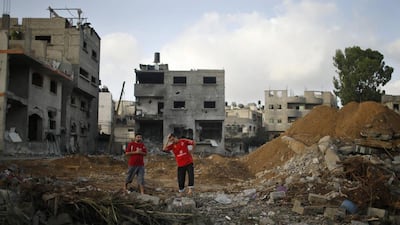Lost amid the carnage, the key fact about the latest Israeli-Palestinian conflagration remains largely unrecognised: Egypt’s new and pivotal role. Egypt has always been the default broker between Israel and Hamas, since it is able to deal with Hamas without according it any greater international and diplomatic legitimacy.
But this time it’s different. It’s no longer about Egypt playing a crucial mediating role. Instead, Hamas is mainly seeking to extract concessions not from Tel Aviv or Ramallah, but from Cairo.
Hamas, or more likely loosely affiliated rogue elements based in Hebron, deliberately lit a fire by kidnapping and murdering three Israeli teenagers. This unleashed a brutal series of tit-for-tat attacks between Israelis and Palestinians that spiralled out of control.
Certainly, the Palestinian Authority based in Ramallah had no control over what was going on in occupied East Jerusalem, let alone unrest among Palestinian citizens of Israel.
The Israeli government, too, clearly lost control of the situation when fanatics grabbed an innocent teenager and tortured and burnt him to death. Even Israel’s security forces seemed to be acting beyond any bounds of restraint as they brutally beat a 15-year-old Palestinian-American cousin of the murder victim.
Passions ruled the day. Years of incitement and frustration on both sides boiled over.
As rocket attacks on southern Israel from Gaza increased, it also seemed that Hamas leaders perhaps didn’t control their own military, and certainly not that of other, more extreme groups like Islamic Jihad.
Yet Hamas sought some kind of benefit in the chaos.
As Israeli forces carried out a brutal crackdown in the West Bank aimed at severely degrading the Hamas presence there, rounding up hundreds of captives and terrifying villagers across the area, Hamas attempted to whip up a third intifada in order to gain a greater foothold beyond Gaza. This failed, largely because most Palestinians didn’t want another uprising because they still recall the consequences of the last one.
So Hamas was dealt a serious blow in the West Bank but remained in the parlous condition in which it had begun. It was broke. It was isolated. It had instituted an agreement with Fatah, but gained nothing. It was smarting under a major and unrelenting crackdown from Egypt. It was experiencing “an identity crisis”, and a tactical and strategic dead-end. Hamas had to do something.
So it fell back on its most familiar territory: rocket attacks against Israel designed to provoke an overreaction. The Israeli military knew better. They recalled previous violent exchanges with Hamas as strategically useless, and indeed highly counterproductive for Israel’s international image and strategic posture. But prime minister Benjamin Netanyahu allowed himself to be sucked into a brutal bombardment campaign with no clear endgame.
Now ordinary people in Gaza are dying again in large numbers. More than 160 have been killed, mostly civilians and many of them children. And significant apparent atrocities sear the conscience.
Some argue that the innocent people of Gaza are all Hamas’s “human shields”. But 1.7 million people living in wretched poverty in one of the most overpopulated places on earth cannot be reduced to that kind of instrumental dehumanisation.
Hamas has three public demands, and if it doesn’t achieve any of them when a ceasefire is finally secured, it will have suffered a massive political and military defeat, although Israel, too, will not benefit. It’s a perfect example of a lose-lose scenario.
Hamas seeks the release of “security prisoners” rearrested by Israel. But more importantly, Hamas has demands on Egypt. It wants the permanent reopening of the Rafah crossing between Gaza and Egypt. And it wants Egypt to facilitate the transfer of badly needed funds from Qatar and other sponsors. Simply, it wants to force Egypt to change its policies.
But why would Abdel Fattah El Sisi, the new Egyptian president, charge to the rescue of Hamas, the Muslim Brotherhood in Palestine?
The Egyptian authorities, and much of the population, view Hamas as co-conspirators in the terrorist campaign in their own country. The Egyptian military has virtually shut down Gaza smuggling tunnels. They reportedly killed some two dozen Hamas operatives in northern Sinai who were allegedly acting in cahoots with the terrorists there.
So Mr El Sisi and company are showing no interest in Hamas’s demands on them. Egypt is very slowly inching toward its familiar role of mediator and ceasefire broker due to humanitarian impulses, public pressure and a prudent concern about containing the growing chaos in Gaza.
Mr El Sisi met the Middle East Quartet envoy Tony Blair recently to begin to explore the prospects. But Cairo certainly doesn’t seem to be rushing to bail out Hamas, or Mr Netanyahu for that matter, for now.
Mr Netanyahu and Israel are probably as interested in a rapid ceasefire as is Hamas, since they achieved what they wanted to strategically in the West Bank before they found the bodies of the teenagers (who they knew all along were dead).
But Israel, like Hamas, is trapped in a conflict neither probably wanted and neither seem likely to gain anything from. Meanwhile, the price is paid in blood, misery and suffering by the innocent Palestinians of Gaza, playthings in the most cynical of vicious games.
Hussein Ibish is a senior fellow at the American Task Force on Palestine and blogs at www. ibishblog.com
On Twitter: @ibishblog


